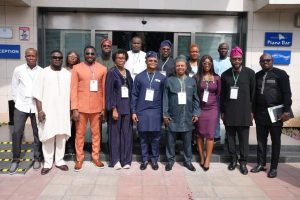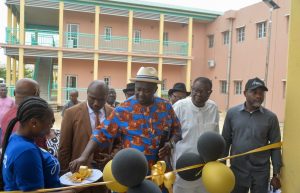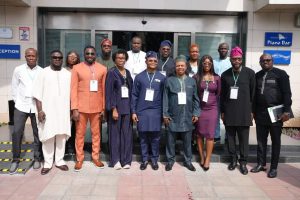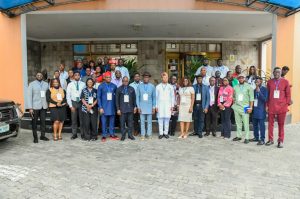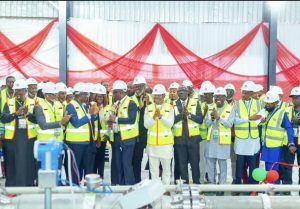 … We‘ve recorded 98% performance with SLAs-Wabote
… We‘ve recorded 98% performance with SLAs-Wabote
The Nigerian Content Development and Monitoring Board (NCDMB) and the Indigenous Petroleum Producers Group (IPPG) have signed a Service Level Agreement (SLA), which would drive local content implementation and simplify the procurement and tendering processes for oil and gas projects.
The Executive Secretary NCDMB, Engr. Simbi Kesiye Wabote and the General Manager, Projects Certification and Authorization Division (PCAD), NCDMB, Engr. Paul Zuhumben signed on behalf of the Board at a ceremony in Lagos on Tuesday, while the Chairman of the IPPG, Mr. Ademola Adeyemi-Bero and the Managing Director, Newcross Petroleum Limited, Engr. Victor Sodje signed for the operating companies.
The SLA was developed by the two parties in line with the provisions of the Nigerian Oil and Gas Industry Content Development (NOGICD) Act and in sync with the Board’s 10-Year Strategic Roadmap.
The Executive Secretary said the SLA would enhance the reduction of contracting timelines to six months to meet the target set by the Minister of State for Petroleum Resources, Dr. Emmanuel Ibe Kachikwu.
The agreement with the IPPG is the third in the series. The Board had executed similar pacts with the Nigeria Liquefied Natural Gas (NLNG) and the Oil Producers Trade Section (OPTS) – the umbrella body of major oil producing companies. “This initiative was the first between a regulator and its key stakeholders in the Nigerian oil and gas industry,” Wabote added.
According to him, the SLA initiative has been very effective since its introduction in May 2017. “It has enhanced the efficiency of the interface between the Board and industry operators. The example can be seen in the swift execution of some contracts in the oil and gas industry such as the LPG vessel supply contract awarded by NLNG, the NLNG Train-7 project, and several other contracts put in place by the international operating companies under the umbrella of the SLA signed with OPTS.
“The finger-pointing to the Board as the point of delay in contracting process has drastically reduced with the transparency engendered by the SLA’s.”
The Executive Secretary also reported that the Board’s delivery on the SLA has been receiving accolades. “One company keeps track of our performance in terms of when their staff submit documents to us and when they get approvals. They scored us 98 percent in terms of the SLA we signed with them.”
He also expressed optimism that the new agreement with IPPG would record a similar success and charged the members to fulfil their part of the deal.
 The aspiration, he underlined, is for indigenous operators to see NCDMB as a key contributor to the Federal Government’s policy on Ease of Doing Business and not an obstacle to business aspirations.
The aspiration, he underlined, is for indigenous operators to see NCDMB as a key contributor to the Federal Government’s policy on Ease of Doing Business and not an obstacle to business aspirations.
Speaking further, Wabote commended IPPG members for demonstrating that indigenous operators can operate oil and gas fields successfully. “I have always highlighted at different fora that our indigenous operators as represented by IPPG are poster children of the Nigerian Content law.”
He challenged the companies to go into manufacturing, reiterating the pledge that the Board would support firms that come up with bankable proposals that would add value to the nation’s hydrocarbons. “The Board is still waiting for more of your 25-member group to come forward with similar or even better proposals than the one we did with Waltersmith.”
Chairman of the IPPG and Managing Director of First E&P, Mr. Ademola Adeyemi-Bero, pledged that the members would comply with the SLA, noting that key mantra of the group were to comply with all regulatory requirements, operate at international standards and add value to the nation’s oil and gas.
He said, “We have gone through it and we are in support. I am signing for the 25 members. The SLA is beneficial to each of our members. It will be a journey for us because it’s an issue of understanding.”
He also confirmed that the secretariat of the group would operationalize the SLA and track compliance on behalf of the members.
Adeyemi-Bero admitted that a major challenge many indigenous producer have with complying with the Nigerian Content Act stemmed from their perception of the law. “Because we are indigenous companies, some of us sometimes assume that we were not meant to comply.”
He identified the key issues in the SLA to include ‘how to efficiently drive Nigerian Content related documentations, submissions, reviews and approvals in line with the NOGIC Act.’
He stressed that their members had neither the vast processes of the IOCs nor well established capital base, hence would sometimes approach the Board for pragmatic concessions.
Discover more from Nigerian Content Development & Monitoring Board
Subscribe to get the latest posts sent to your email.


